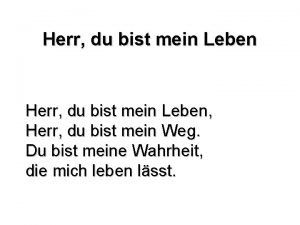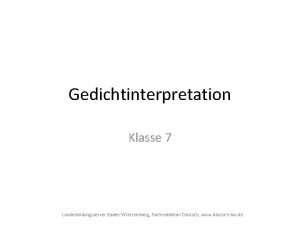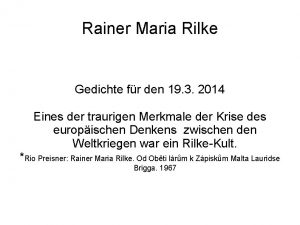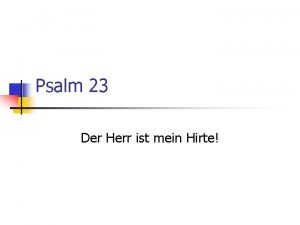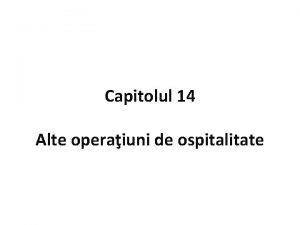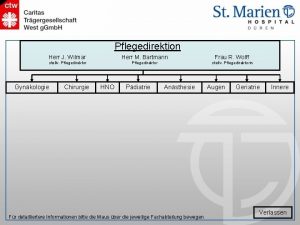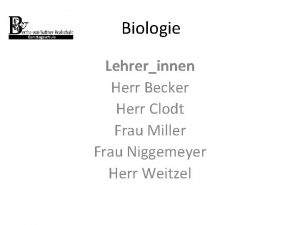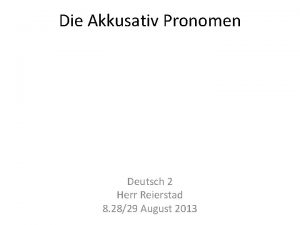DAS NEUE UND DAS ALTE Deutsch 1 Herr





















- Slides: 21

DAS NEUE- UND DAS ALTE Deutsch 1 Herr Reierstad 6. Januar 2014

WICHTIGE FRAGE: How do you say where you live in German?

DAS VERB “WOHNEN” Øist ein “est ten” Verb. ØMuesst ihr das eigentlich aufschreiben? • ich • du • e/s/e • wir • ihr • s/S • Praet. • Perf. gewohnt wohne wohnst wohnen wohnte hat

ALTENGLISCH v. There is an Old English form of this verb, “wone. ” Regrettably, I found no examples of it it literature. v. I did, however, find the radio station WONE, which plays classic rock in the Akron area. Old, classic; sort of a connection…. .

WO WOHNST DU? Ich wohne in Clemmons.

WOHNST DU IN WINSTONSALEM? Nein, ich wohne nicht in W-S. Ich wohne in Clemmons.

NICHT DAS GLEICHE, …… Wie lange hast du in Clemmons gewohnt? o. How long did you live in Clemmons? (no loger there) Wie lange wohnst du in Clemmons? ØHow long have you lived/been living in Clemmons? (you still reside there)

NICHT DAS GLEICHE, TEIL 2…. . Ich habe 4 Jahre in Clemmons gewohnt. I lived in Clemmons for 5 years. Ich wohne seit 4 Jahren in Clemmons. I’ve lived in Clemmons for 4 years.

TJA…. WARUM DEN “JAHREN? ” Remember the Dative prepostions? aus out of, from ausser except bei by, next to mit with nach after, to seit since (time) von from, by zu to gegenueber across from All you need to know here is that when you use the Dative case, you need to add “-n” to most plural nouns: §Ich wohne seit 10 Jahren in Muenchen. §Er wohnt seit 5 Jahren in Koeln.

ASK 3 PEOPLE AT YOUR TABLE THE FOLLOWING QUESTIONS. MAKE THEM ANSWER. 1. Wo wohnst du? 2. Wie lange wohnst du da? (da = there)

WELCHE SAETZE SIND RICHTIG? 1. Ich spiele Gitarre seit sechs Jahren. 2. Seit sechs Jahren spiele ich Gitarre. 3. Gitarre spiele ich seit sechs Jahren.

ALLE SIND RICHTIG! S V O T Ich spiele Gitarre seit sechs Jahren. T V S O Seit sechs Jahren spiele ich Gitarre. O V S T Gitarre spiele ich seit sechs Jahren.

BITTE INS DEUTSCHE UEBERSETZEN! (NICHT SCHREIBEN) 1. 2. 3. 4. What do you do in your free time? I play geetar. How long have you played geetar? I’ve played geetar for 500 years. (maybe Yoda has a hobby!) 5. How long did you play piano? 6. I played piano for 3 days.

BITTE INS DEUTSCHE UEBERSETZEN! (NICHT SCHREIBEN) 1. What do you do in your free time? Was machst du in deiner Freizeit? 2. I play geetar. Ich spiele Gitarre. 3. How long have you played geetar? Wie lange hast du Gitarre gespielt? 4. I’ve played geetar for 500 years. Ich habe Gitarre seit 500 Jahren gespielt. 5. How long did you play piano? Wie lange hast du Klaver gespielt? 6. I played piano for 3 days. Ich habe Klavier 3 Tage gespielt.

ABER JETZT KOMMEN WIR ZUR SACHE…. You will have a small, but important mid-term. q. It will consist of 3 parts: a verbal a written, and a grammar part. q. Westies will take all 3 on the same day; Taborites will take the verbal part on Friday, since I will not be here on Monday.

TEIL 1: SPRECHEN (AUTOMATISCH) You will all be required to say the following in German: vthe alphabet vthe numbers from 0 -20

TEIL 1 A: SPRECHEN (WAHLLOS) You will be expected to answer 5 of these questions, chosen at random: 1. Wie heisst du? 2. Wie alt bist du? 3. Woher kommst du? 4. Wie kommst du zur Schule? 5. Was machst du in deiner Freizeit? 6. Was machst du gern? 7. Was machst du nicht gern? 8. Wo wohnst du?

TEIL 2: SCHREIBEN You will write 1 -2 paragraphs about yourself, detailing the following: 1. your name 2. your age 3. where you come from 4. where you live 5. how long you’ve lived there 6. one of your hobbies 7. how long you’ve been doing it 8. how you like school

TEIL 3: GRAMMATIK/KULTUR You will be expected to list the following: The following verbs: Øsein Øwar Øhaben Økommen Øfinden Øradeln

TEIL 3: GRAMMATIK/KULTUR You will be expected to list the following: v. The “der-” forms: v. The names of the Germanspeaking countries (in German) v. The capital cities of the above countries (in German) vthe flags

EURE HAUSAUFGABE Write your rough draft for the writing part of the test. It is important that you do this because the next time we meet, you and your classmates will peer edit each other’s work. I will also look at what you have.
 Das alte ist vergangen das neue angefangen
Das alte ist vergangen das neue angefangen Lied herr du bist mein leben
Lied herr du bist mein leben Hüberts sche schule hopsten
Hüberts sche schule hopsten St galler management konzept
St galler management konzept Filtro atenuado
Filtro atenuado Fachredaktion deutsch www.deutsch-bw.de
Fachredaktion deutsch www.deutsch-bw.de Mussorgsky bilder einer ausstellung analyse
Mussorgsky bilder einer ausstellung analyse Braille neue
Braille neue Helvetica neue ltstd-cn
Helvetica neue ltstd-cn Nost prüfung
Nost prüfung Sofie thiel
Sofie thiel Neue sachlichkeit historischer hintergrund
Neue sachlichkeit historischer hintergrund Neue wege heppenheim
Neue wege heppenheim Neue gymnasiale oberstufe
Neue gymnasiale oberstufe Spätherbst in venedig analyse
Spätherbst in venedig analyse Teuer adjektiv deklination
Teuer adjektiv deklination Neues denken für neue lösungen
Neues denken für neue lösungen Alte medien
Alte medien Herr du erforschest mich und kennest mich
Herr du erforschest mich und kennest mich Alte junge frau
Alte junge frau Psalm 24 der herr ist mein hirte
Psalm 24 der herr ist mein hirte Emagel
Emagel

